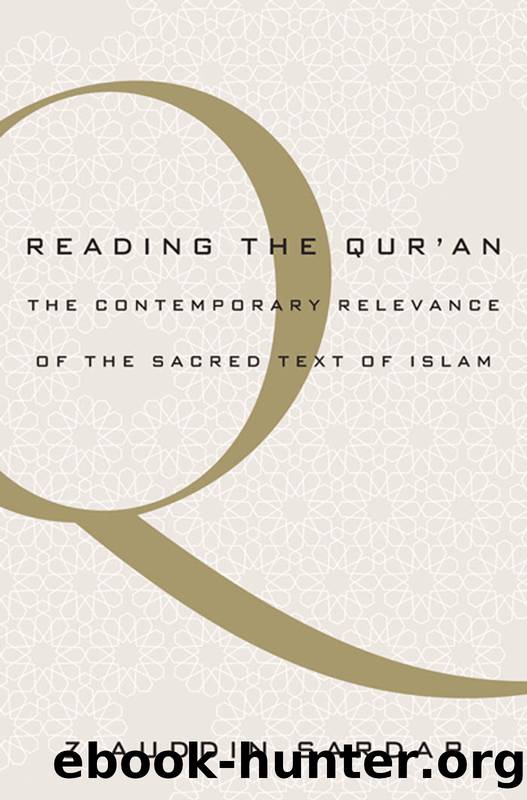Reading the Qur'an by Sardar Ziauddin;

Author:Sardar, Ziauddin;
Language: eng
Format: epub
Publisher: Oxford University Press USA - OSO
Published: 2011-11-15T00:00:00+00:00
26
AL-BAQARA
WITNESS
282. O you who believe, When you give or take credit among yourselves for a stated term, write it down. Let a scribe write down in your presence, in all fairness. Let no scribe refuse to write as God has taught him. So, let him write and let the debtor dictate. Let him fear God, and let him not diminish a jot from it. If the debtor is feeble-minded, weak, or is unable to dictate, let his guardian dictate in all fairness. Summon two witnesses from among your men. If two men are not at hand, then a man and two women, of such as you approve as witnesses, so that if one forgets, the other can remind her. Nor should witnesses be reluctant if summoned. And do not be reluctant to write it down, whether small or large, up to its set term, for this is fairer in Godâs sight, more reliable as evidence, and more likely to prevent doubts. However, if it concerns an immediate commercial deal that you transact among yourselves, no blame attaches to you if you do not write it down. And have witnesses whenever you trade with one another, but neither scribe nor witness must suffer harm. If you do them harm, this would be an offence on your part. And remain conscious of God who teaches you; and God has full knowledge of everything.
283. If you are on a journey, and do not find a scribe, let there be a surety handed over. If you trust one another, let the trustee fulfil his trust, and let him fear God, his Lord. And do not conceal evidence; whoever conceals it, his heart is tainted with sin. God knows full well all that you do.
At first sight this passage would seem to be a logical part of the previous discussion on charity and usury. Certainly, it is the Qurâan at its most practical. I take it as a separate passage, mainly because of the interpretation it has received and the general misconstruction and controversy attributed to it. How, after all we have just found out about applying rules of equity and fairness, of building inclusiveness and fellow feeling in pragmatic ways, could the Qurâan turn around and make the veracity of women half that of men? It is clear to me, and any reasoned reading, that that is precisely not what is being said. Such a conclusion would defy what the Qurâan consistently argues elsewhere, and is testimony to the ease with which misogyny and patriarchal prejudice has been read into the text to turn meaning on its head.
During the time of the Prophet Muhammad, Arabia was an illiterate society; reading and writing were not the norm. In this passage, the Qurâan continues the theme of social transformation with the emphasis now on a cultural shift from an oral society to a literate one. The theme of usury, concerned with the ethics of lending and borrowing money, naturally leads us, in the longest verse in the Qurâan (282), to the subject of contracts.
Download
This site does not store any files on its server. We only index and link to content provided by other sites. Please contact the content providers to delete copyright contents if any and email us, we'll remove relevant links or contents immediately.
| Hadith | History |
| Law | Mecca |
| Muhammed | Quran |
| Rituals & Practice | Shi'ism |
| Sufism | Sunnism |
| Theology | Women in Islam |
The History of Jihad: From Muhammad to ISIS by Spencer Robert(2213)
Nine Parts of Desire by Geraldine Brooks(2013)
The Turkish Psychedelic Explosion by Daniel Spicer(1999)
The First Muslim The Story of Muhammad by Lesley Hazleton(1889)
The Essential Rumi by Coleman Barks(1641)
The Last Mughal by William Dalrymple(1575)
Trickster Travels: A Sixteenth-Century Muslim Between Worlds by Davis Natalie Zemon(1547)
1453 by Roger Crowley(1509)
by Christianity & Islam(1353)
God by Aslan Reza(1339)
Muhammad: His Life Based on the Earliest Sources by Martin Lings(1308)
A Concise History of Sunnis and Shi'is by John McHugo(1279)
Magic and Divination in Early Islam by Emilie Savage-Smith;(1204)
The Flight of the Intellectuals by Berman Paul(1187)
No God But God by Reza Aslan(1166)
Art of Betrayal by Gordon Corera(1136)
What the Qur'an Meant by Garry Wills(1124)
Getting Jesus Right: How Muslims Get Jesus and Islam Wrong by James A Beverley & Craig A Evans(1083)
The Third Choice: Islam, Dhimmitude and Freedom by Durie Mark & Ye'or Bat & Bat Ye'or(1071)
